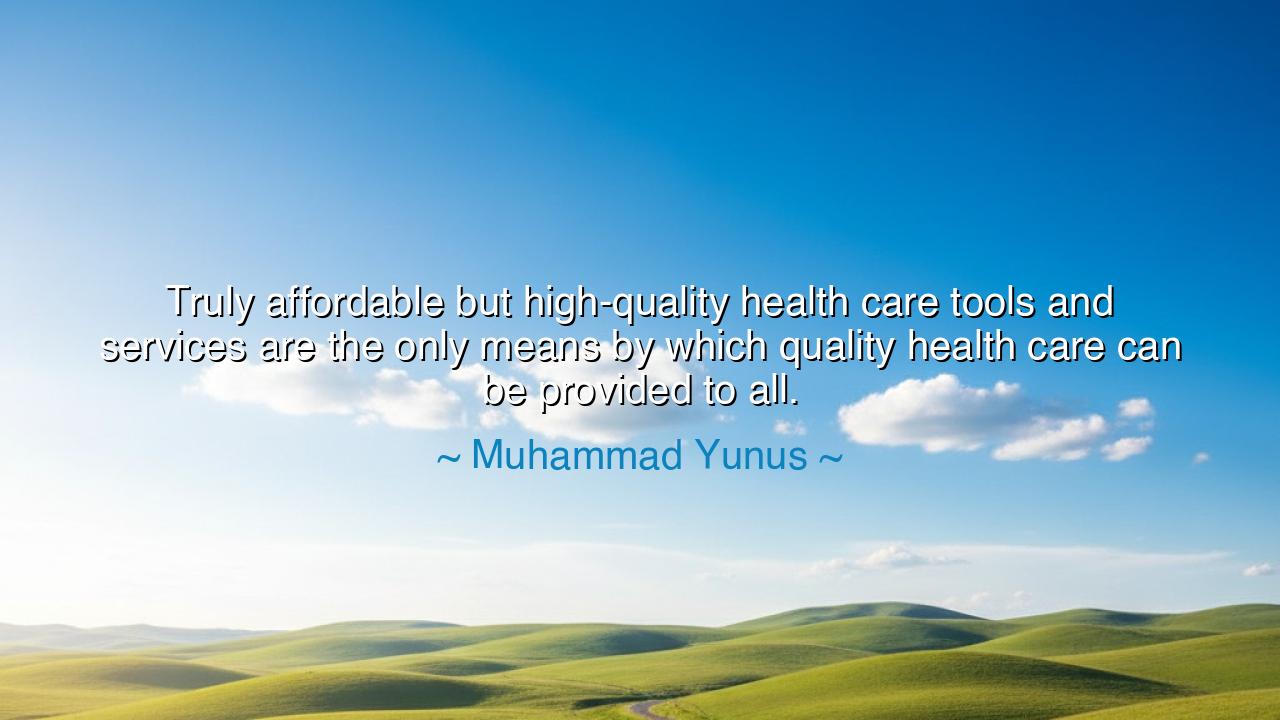
Truly affordable but high-quality health care tools and services
Truly affordable but high-quality health care tools and services are the only means by which quality health care can be provided to all.






“Truly affordable but high-quality health care tools and services are the only means by which quality health care can be provided to all.” These words of Muhammad Yunus, the visionary founder of microfinance and champion of social business, resound like a call to conscience for our modern age. They are not merely an argument of economics, but a moral declaration — that the right to health is sacred, and that only when health care becomes both accessible and excellent can a society truly call itself humane. Yunus, who has dedicated his life to lifting the poor out of suffering, understood that health, like food, education, and dignity, must not be the privilege of the few, but the inheritance of all.
In his homeland of Bangladesh, Yunus saw with his own eyes the painful paradox that afflicts many nations — that medicine existed, yet healing did not reach the people. Hospitals gleamed in cities, while in the villages, children died for lack of simple treatments. Skilled doctors were few, and the tools of healing were priced beyond the reach of those who needed them most. Out of this suffering, Yunus spoke his truth: that health care must be both affordable and of high quality, for one without the other is a false cure. Cheap medicine that fails is cruelty; excellent medicine that none can afford is useless. Only when these two pillars stand together can the house of health shelter all of humanity.
The ancients, too, knew this truth. In the scrolls of the Hippocratic Oath, physicians were sworn to serve not wealth, but life itself. The healers of ancient Greece, India, and China believed that medicine was a sacred trust, a gift to be shared freely with those in need. They walked among the poor, treating wounds, mixing herbs, and offering wisdom, not as merchants but as servants of the divine. Their calling was guided by the principle that the art of healing belongs to no one man, but to the whole human family. Yunus revives that same spirit, declaring that modern medicine — with all its dazzling technology and brilliance — must return to its ancient heart: compassion.
To understand the power of Yunus’s vision, one may look to his creation of Grameen Health, a network of social businesses designed to provide medical care at minimal cost. Instead of waiting for governments or charities, he built a system where medicine became sustainable — where patients paid what they could, and the system replenished itself through service, not profit. Villages once abandoned by the health system began to bloom with clinics, and mothers who once walked miles for care could find healing within their reach. In his work, we see the living proof of his words: that when affordability and quality walk hand in hand, even the poorest may live with dignity.
Yunus’s quote also carries a profound warning to the modern world — a world in which health has become a commodity, traded in markets and guarded by patents. He reminds us that when medicine becomes a business first and a calling second, the soul of healing begins to rot. The ancients would have called this hubris — the arrogance of man placing profit above compassion. But when innovation is guided by love, when science is wedded to justice, then medicine becomes what it was always meant to be: a bridge between human suffering and divine mercy.
Yet Yunus’s teaching is not a cry for idealism alone. It is a call to practical action. He urges inventors to create tools that are simple yet effective, doctors to serve with humility, and leaders to build systems that balance compassion with efficiency. Every human being, he teaches, has a role in this sacred chain. The engineer who designs a low-cost diagnostic device, the nurse who serves in a remote village, the policymaker who ensures fair pricing — all become builders in the temple of healing. In this way, the words of Yunus become a roadmap for civilization itself: that progress means little if it does not uplift the weakest among us.
Therefore, O seekers of wisdom, take this lesson to heart: health is not a privilege, but a birthright. The strength of a society lies not in its monuments or its wealth, but in the health of its people. Work, then, to make healing accessible. Innovate with compassion. Refuse to rest while one child dies for want of a simple cure. For every heart that chooses service over selfishness, the vision of Muhammad Yunus moves closer to reality — a world where every human being, rich or poor, may stand tall and whole beneath the sheltering wings of justice, compassion, and health for all.
Thus, the quote becomes more than words; it becomes a commandment for the future — that true progress is measured not by how much the few possess, but by how well the many are cared for. Let this truth be your guide, and may you live not as a consumer of healing, but as a bringer of it — for in giving health, you give life itself.






AAdministratorAdministrator
Welcome, honored guests. Please leave a comment, we will respond soon